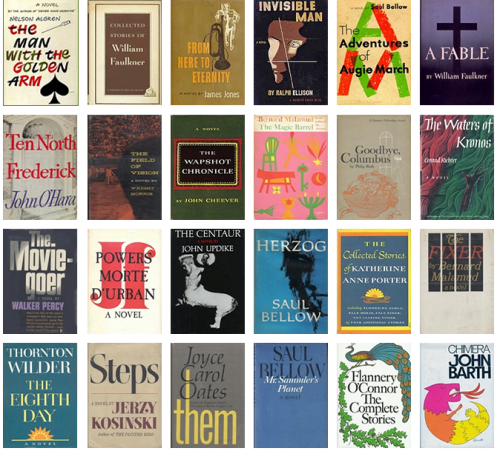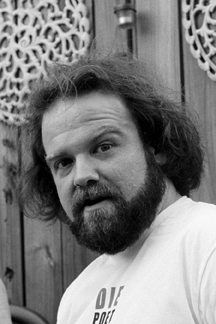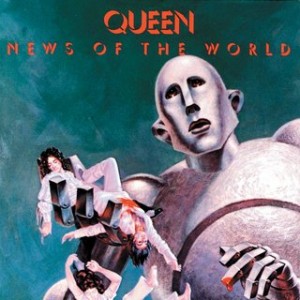Power Quote: Shelley
Ah, woe is me!
What have I dared? where am I lifted? how
Shall I descend, and perish not? I know
That Love makes all things equal: I have heard
By mine own heart this joyous truth averred:
The spirit of the worm beneath the sod,
In love and worship, blends itself with God!
–Epipsychidion
National Book Award’s book-a-day

National Book Award’s daily blog on fiction winners has been going on a while, so sorry I’m a little late — but it’s kinda good in a way, since now the majority of the content is already there. It’s a great in depth resource for those who like to tap now and then the esteemed list of winners. If you’ll grant me a commentary (as I always seem to have one), it’s funny how some of the titles shine throughout history, while others become completely obscured over time. One wonders if the former ones are simply written by authors with greater career trajectories, or if the “inherent quality” of the works is at matter. There’s this idea we have that capital T truth takes time to show us who was right all along, never mind that political despots and religious fanatics subscribe to this same idea of “in the end I am right.” Just pointing this out because I see a lot of “aesthetic/artistic fundamentalism” in creative circles. Pretty scary way to think, I think.
And for every winner there are the oh-so-close runner ups and the oh-kinda-close shortlist. In this numbers game of cultural eternity, disappointment is on one’s side; and even when one wins, one may not even be remembered — and that’s all one wants right? to be remembered? The ego is like a first relationship: we want to be remembered forever for just okay sex.
September 16th, 2009 / 2:08 am
Ander Monson Will Hack You

Ander Monson
I re-read Ander Monson’s brilliant “Essay as Hack” today and thought I might share a section for anyone out there who is writing memory-based stories or personal essays.
The brain reconfigures memory, reorders events, resets them among other events to form narrative, causality: it creates sense. The mind tells itself stories about what happens to it. So me saying that I did X because of Y rests on thousands of assumptions about who or what I think I am, how I thought of myself then—transmuted into how I think about myself now.
…Any sort of attempt to sort meaning from the past is fraught in thousands on thousands of ways, exponentially splintering. The more you think about it the more it asymptotically approaches impossibility.
This is not to suggest we shouldn’t attempt it. The attempt is glorious, and attempting rewires the brain. It moves the circuitry around, attaching a new conclusion to an action, reconstructing self. In a way, thinking about the self hacks it.
chris higgs’ latest post produced a discussion about audience. i have thought about this before. my question is: can you ever have an audience (outside of yourself) in mind while you are writing? if you have an audience in mind before writing, doesn’t that mean that you are dealing with something that is already common? and doesn’t that mean that you are offering something that is not truly unique? the discussion branched off into the classic “indie small audience” versus the “mainstream big audience” talk. i don’t understand anyone wanting either in advance. audience seems to be something that happens afterward, long after anything the writer does. i understand eventually feeling good about a large group of people reading something you are pleased with, but i don’t understand wanting this in advance of pleasing yourself. again, i am not suggesting that only small audiences are good (good meaning representative of quality) and big audiences are always bad. what i mean is, can you imagine how drained a book that appeals to the whole world would be? i don’t think it’s even possible to imagine a book the entire u.s. would like, or an entire state. which to me, seems to mean that the audience you don’t have is also important. i’m just thinking.
Is Dan Chaon a god? Yes. Yes, he is. This interview proves it. As does his insanely great taste in music. (Seriously, read Await Your Reply, yo.)
News of the World of the Day
Stephen Elliott at The Rumpus- “Notes on Book Publishing in a Socially Networked World.” Our main man does some post-game on his Adderall Diaries galley-lending library project. >>One thing to remember: If you don’t write the right book nothing will work. The reader has to connect with the work. I would advise against putting significant time and resources into a work you don’t really believe in.<<
Joann Wypijewski is probably the most incisive and trenchant writer in America on matters of sexuality and sexual politics. In this new piece in The Nation, she talks about the profit-motive behind medicalizing sexual behavior- “Sexual Healing.”
Over at the Barnes & Noble review site, Maud Newton is onto Lorrie Moore’s A Gate at the Stairs. >>Since the publication of her first collection, Self-Help, in 1985, so many readers have identified with Moore’s witty, cynical and yearning failed-relationship stories at a similarly impressionable stage that her writing has become as formative an influence on American fiction as her hero John Updike’s was in an earlier era.<<
Oh, hey, special The Nation bonus: William Deresciewicz on a new biography of Marquez, and this classic by Akiva Gottlieb, a great short piece by him on one of my favorite subjects/bands, Against Me!: “Political Punk: Rage Against the Band.”
New blog: Letters of Note
New art: 21st Century boys & girls golden mountain, by ssin
New issue of The Collagist | Kim Chinquee judges Collagist flash fiction contest | HTMLGIANT designer Gene Morgan redesigns Pank Magazine | Excerpt from Shoplifting from American Apparel at Hipster Runoff | Leo Tolstoy that guy on Led Zeppelin IV album cover
Power Quote: DFW
Felt better putting this up a couple of days after the anniversary:
This is the great nightmare when you are doing something long and hard—you’re terrified that it will be perceived as gratuitously long and hard, as some “avant garde for its own sake” exercise. And having done some of that stuff, I think, early in my career, I was really scared about it. The trick of this—I’ve got this whole rant about it—I think a lot of avant garde fiction and serious literary fiction that bitches and moans about readers defection, in blaming it all on TV, a lot of the avant garde has forgotten that part of its job is to seduce the reader into being willing to do the hard work.
—David Foster Wallace talking about Infinite Jest on Bookworm.
Congratulations to anyone who enjoyed an Infinite Summer.
(Can I express my quiet dismay over the idea that a fine tribute to a great writer is moving on and, sans name and domain change, becoming a book club? I have nothing against book clubs. I have nothing against Dracula. I guess I don’t really understand, though, why a thing can’t have a single focus, carry out a task until completion, and then just end.)
Reconsidering Stereotypes

My brother sent me this link to the Denver Broncos Cheerleaders, along with a note saying: “one of the questions is what book are you reading?”
I began clicking through the profiles.


